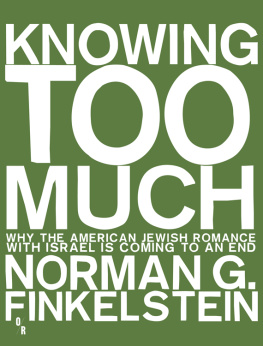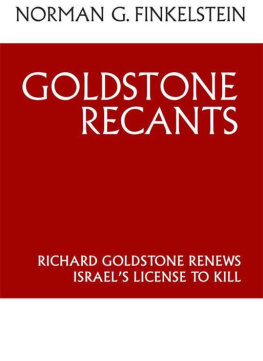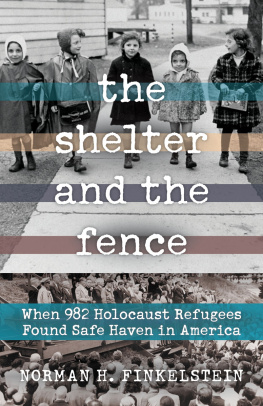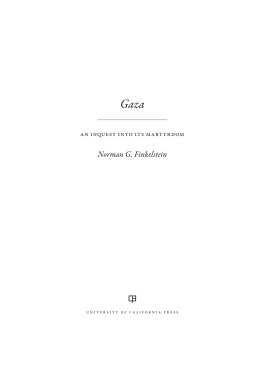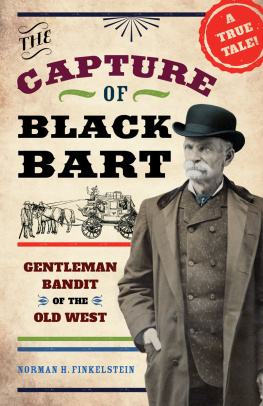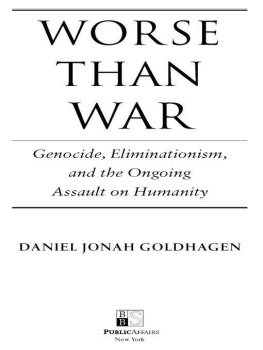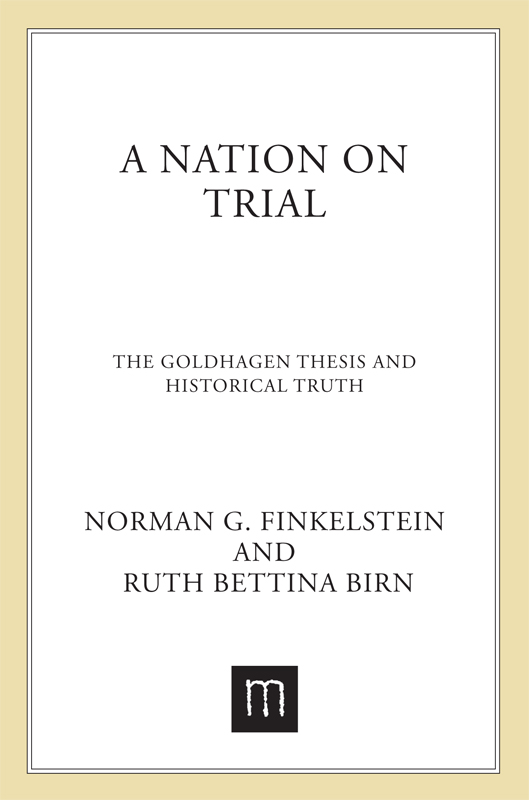
The author and publisher have provided this e-book to you for your personal use only. You may not make this e-book publicly available in any way. Copyright infringement is against the law. If you believe the copy of this e-book you are reading infringes on the authors copyright, please notify the publisher at: us.macmillanusa.com/piracy.
Contents
Acknowledgments
Norman G. Finkelstein wishes to thank Ellen Adler, David Abraham, Rudolph Baldeo, Sara Bershtel, Roane Carey, Noam Chomsky, Samira Haj, Adele Oltman, Shifra Stern, Jack Trumpbour, and Cyrus Veeser for comments on an earlier draft. This essay is dedicated to the memory of his beloved parents, both survivors of the Warsaw Ghetto and the Nazi concentration camps: only a rational apprehension of what happened can give point to their martyrdom.
Ruth Bettina Birn wishes to acknowledge the collaboration of Dr. Volker Riess in the preparation and writing of this article.
Both authors wish to thank the staff of Metropolitan Books for their assistance and support.
In the opinion, not of bad men, but
of the best men, no belief which is
contrary to truth can be really useful.
JOHN STUART MILL
Part One
DANIEL JONAH GOLDHAGENS CRAZY THESIS
A Critique of Hitlers Willing Executioners
Norman G. Finkelstein
Rarely has a book with scholarly pretensions evoked as much popular interest as Daniel Jonah Goldhagens study Hitlers Willing Executioners: Ordinary Germans and the Holocaust.
What makes the Goldhagen phenomenon so remarkable is that Hitlers Willing Executioners is not at all a learned inquiry. Replete with gross misrepresentations of the secondary literature and internal contradictions, Goldhagens book is worthless as scholarship. The bulk of what follows documents this claim. But then, given its demonstrable flimsiness, we have to ask why the book has enjoyed such a clamorously popular reception. In the conclusion I speculate upon one possible explanation of this conspicuously puzzling fact.
Before the Genocide
Genocide was immanent in the conversation of German society. It was immanent in its language and emotion. It was immanent in the structure of cognition.
HITLERS WILLING EXECUTIONERS , 449
I.
In a seminal study published thirty-five years ago, The Destruction of the European Jews, Raul Hilberg observed that the perpetrators of the Nazi holocaust were not different in their moral makeup from the rest of the population. [T]he machinery of destruction was a remarkable cross-section of the German population. These representative Germans, Hilberg went on to say, performed their appointed tasks with astonishing efficiency: No obstruction stopped the German machine of destruction. No moral problem proved insurmountable. When all participating personnel were put to the test, there were very few lingerers and almost no deserters. Indeed, an uncomfortably large number of soldiers delighted in death as spectators or as perpetrators.
Long before Daniel Jonah Goldhagens study, it was thus already known that ordinary Germans were Hitlers willing and not infrequently cruel executioners. It is Goldhagens thesis that the central causal agent of the Holocaust was the German peoples enduring pathological hatred of the Jews ( Hitlers Willing Executioners [hereafter HWE ]: 9). To cite one typical passage:
[A] demonological antisemitism, of the virulent racial variety, was the common structure of the perpetrators cognition and of German society in general. The German perpetrators were assenting mass executioners, men and women who, true to their own eliminationist antisemitic beliefs, faithful to their cultural antisemitic credo, considered the slaughter to be just. ( HWE: 3923)
There are no prima facie grounds for dismissing Goldhagens thesis. It is not intrinsically racist or otherwise illegitimate. There is no obvious reason why a culture cant be fanatically consumed by hatred. One may further recall that, Goldhagens claims to novelty notwithstanding, his argument is not altogether new. In the immediate aftermath of World War II, the genesis of the Final Solution was located in a twisted German mind or German character. This is also the dominant image of the Nazi extermination among Jews and in popular culture generally.
Bolstered as it is by a bulging scholarly apparatus, the audacious sweep of Goldhagens thesis nonetheless merits emphasis. He argues that, for centuries, nearly every German was possessed of a homicidal animus toward Jews. Thus, he suggests that more than 8090 percent of the German people would have relished the occasion to torture and murder Jews. Goldhagens true distinction is to argue that German anti-Semitism was not only an integral but rather that it was the sufficient condition for perpetrating the extermination of the Jews: With regard to the motivational cause of the Holocaust, for the vast majority of perpetrators, a monocausal explanation does suffice ( HWE: 416, emphasis in original; cf. 455, 582 n42).
The Hitlerite regime accordingly plays a subordinate role in Goldhagens comprehension of the Final Solution. Inasmuch as the inclination for killing Jews predated Nazi political power, the Nazis were easily able to harness the perpetrators preexisting antisemitism once Hitler gave the order to undertake the extermination ( HWE: 399, 463; cf. 4189). All Hitler did was unleash the pent-up antisemitic passion, unshackle and thereby activate Germans preexisting, pent-up antisemitism, and so on ( HWE: 95, 442, 443).
Leaving to one side the question of its veracity, this last formulation of Goldhagens is still problematic. Consider that he repeatedly contradicts it. Had it not been for Hitlers moral authority, Goldhagen observes, the vast majority of Germans never would have contemplated the genocide against the Jews ( Reply: 42; cf. HWE: 4467). It was the Nazis unprecedentedly extreme and thoroughgoing cognitive-moral revolution that, Goldhagen suggests, produced Germanys lethal political culture ( HWE: 456; cf. Reply: 42). Unaware that these Germans were like no Germans they had ever known, Goldhagen explains, Soviet Jewry initially greeted the Nazi soldiers obligingly and without hostility ( HWE: 587 n87). But if Goldhagens thesis is correct, these Germans were like all other Germans.
On a related issue, Goldhagen dismisses the need for a comparative study by pointing up the centrality of Hitlers regime: Whatever the antisemitic traditions were in other European countries, it was only in Germany that an openly and rabidly antisemitic movement came to power that was bent upon turning antisemitic fantasy into state organized genocidal slaughter ( HWE: 419; cf. Reply: 43). Yet Goldhagens account merely restates the problem: Why did an openly and rabidly antisemitic movement come to power in Germany and not elsewhere? The answer cannot be the uniqueness of German anti-Semitism. That simply returns us to the comparative question. True, Goldhagen argues: Had there not been an economic depression in Germany, then the Nazis, in all likelihood, would never have come to power ( Reply: 42; cf. HWE: 87). But that just evades another obvious question: If Germans were so possessed by a fanatical anti-Semitismmore on which directlywhy did an openly and rabidly antisemitic movement have to await an economic depression to attain power?
Indeed, Hitlers Willing Executioners is a monument to question-begging. Eschewing the claim that it is inexplicable, Goldhagen sets as his objective to explain why the Holocaust occurred, to explain how it could occur. He concludes that it is explicable historically ( HWE: 5, 455). Goldhagens thesis, however, neither renders the Nazi holocaust intelligible nor is it historical. For arguments sake, let us assume that Goldhagen is correct. Consumed by a ferocious loathing of the Jews, the German people jumped at Hitlers invitation to exterminate them. Yet the question still remains, Whence the hatred of Jews? A nation of genocidal racists is, after all, not exactly a commonplace.



